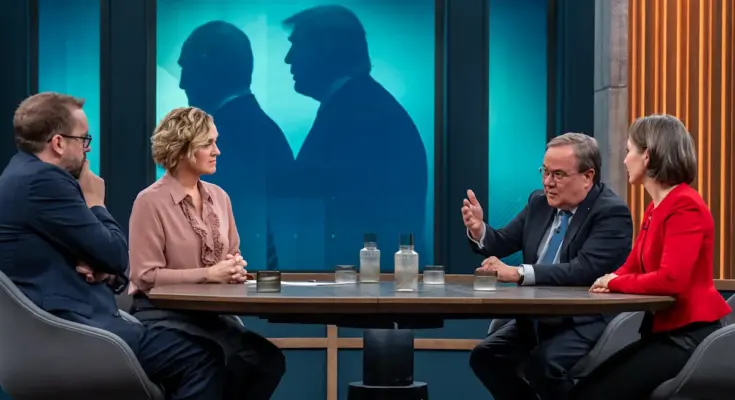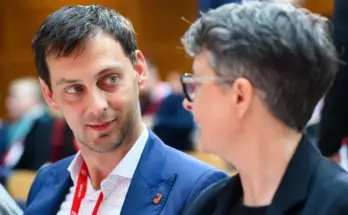In the TV show “Caren Miosga” Armin Laschet, Claudia Major and Paul Ronzheimer discussed the chances of achieving lasting peace between Russia and Ukraine with the presentation of the US plan.
America is launching a new effort to end the stalemate war in Ukraine. To do this, they have launched a 28-point plan that has caused horror in Ukraine and Europe because much of the plan takes Russia’s wishes into account. After US Secretary of State Marco Rubio accepted a number of demands for change in Geneva on Sunday, Caren Miosga Armin Laschet (CDU), chairman of the Foreign Affairs Committee, military expert Claudia Major, and journalist and Bambi award winner Paul Ronzheimer discussed whether peace can truly emerge from these commitments.
War reporter Ronzheimer (“Bild”/WELT) is considered one of the best experts on Ukraine and its political realities. He regularly spoke with soldiers, politicians and local people. Ronzheimer said: “Everyone in Ukraine knows that someday there will be painful concessions. Russia is making very slow progress, but they are making progress.” This war of attrition, which cost the Russian army many lives, would ultimately produce only one victor: Russia. Ronzheimer stressed that the so-called peace plan contains “everything Vladimir Putin has always wanted.”
Claudia Major doesn’t even want to talk about a plan, she said: “I wouldn’t call it that because it was very sloppy and not well formulated and thought out. I call it a document. It’s not just about Ukraine, it’s also about us, about all of Europe.” He clearly finds it difficult to believe in a sustainable peace: “From Russia’s point of view, there is no reason to end this war. This is a war of attrition that they will win someday. Russia is trying to achieve negotiations that they are currently not militarily gaining.”
European politician Laschet criticized the poor position of European countries, but he saw the blame as clearly on their own side: “Europe only acted to prevent the worst. Again, this is just a reaction. If we had an idea, we would have conveyed it to the Americans so they could bring it into their discussions. But we ourselves were not active players. There was no clear strategy. There was no if-then.”
Major then said to Laschet: “You have been in government since May. Always saying that Europe is not producing results sounds strange. As the largest country in Europe, we can also make an advance payment. This is revenge for the fact that Europe has not invested militarily in the last ten years.” Laschet agrees with this, but in the case of Germany he blames the SPD and the Green Party. It was only when Russia invaded Ukraine in February 2022 that rethinking began to take hold among these parties: “Satellites, reconnaissance, then we realized that we had no capabilities at all. No matter how grandly we talk now, we Europeans cannot replace America for Ukraine.”
The group agreed that the US was trying to act as a mediator, but not take sides. Therefore, Major came to the conclusion: “We are experiencing the end of the Americanization of NATO. America no longer wants to be a participant, but rather a moderator.” It is appropriate that the document states that Russia should determine who will become NATO members in the future. “That would mean a declaration of total bankruptcy,” Major said.
Laschet agrees: “The most powerful man in the world is presenting this document. The Americans see themselves as neutral mediators between Russia and Europe.” Ronzheimer realized: “He realized that a lot of pressure on Zelensky was more beneficial than a lot of pressure on Putin.” Ronzheimer reminds us of what is now at stake for Ukrainian President Volodymyr Zelensky: “For Zelensky, as president, what matters is everything. About his political future, perhaps also about his own life.” As an expert on Zelensky, it was clear to him that he would not be able to become president again in a possible general election.
But how should Zelenskyj first explain to his people that he is ready to give up territory? A thing that not everyone at the table should do. Laschet said: “There should be no recognition of Ukrainian territory by Russia under international law.” And Major thinks: “Two nuclear powers are telling Ukraine that it’s OK to use war to move borders. This entire document radiates a desire to control Ukraine and launch it into Europe as well. That’s the main motive behind all those points.”
According to Laschet, the alternative is a ceasefire. “That means no one is allowed to use force to move borders anymore,” he said. Such a ceasefire could last a long time, but would never be final under international law.
Ronzheimer and Major shook their heads together. “Putin will not be part of the modified plan,” Ronzheimer said. Major: “I don’t think the new version of this document will be interesting from the Russian point of view. We must no longer fall into the illusion that sometimes exists in the debate in Germany that Russia wants to end this war.”
But Laschet stressed that the job of politicians is to do everything for peace. Especially because what matters is not how Putin reacts, but how Donald Trump does in the end: “Our focus should not be on Putin, but the question: How can we strengthen Trump, Rubio and the powers that want to continue to cooperate with Europe in NATO in America?”
The major seemed a little resigned when he came to the conclusion: “If this plan, as it stands now, is carried out, it will lead to a lull in the fighting that will allow Russia to rebuild its armed forces in peace.” Security guarantees are a central point that has so far received little attention in discussions, he said. Who guarantees that an agreement, whatever its final form, will be implemented? That every violation will be subject to sanctions?
Laschet nodded: “This point needs to be sharpened and proven. Zelensky can only explain such a move in his own country if he can show: There are a lot of guarantees here – so we have a guarantee that something like this will not happen to us again.”



